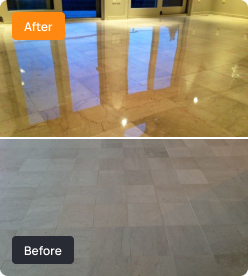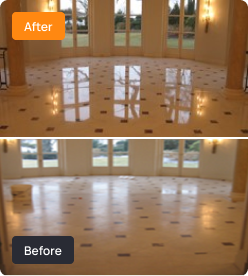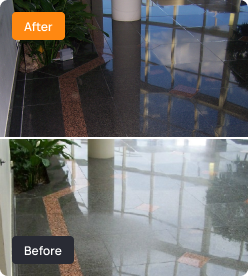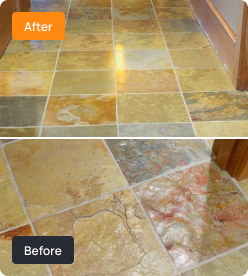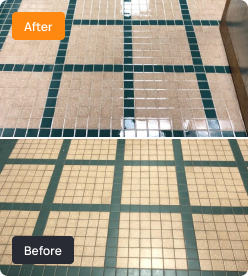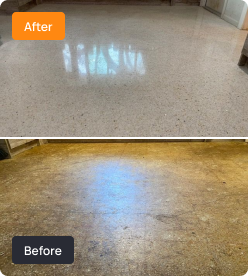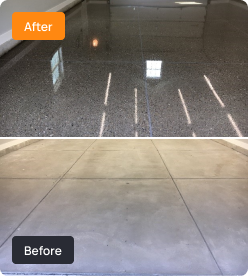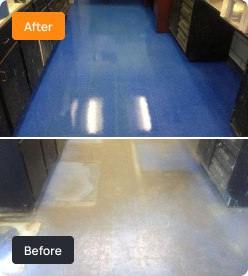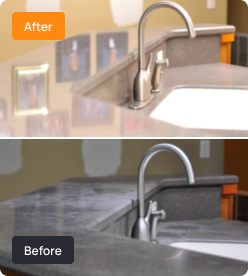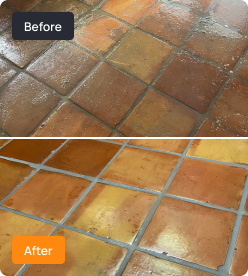Cleaning with Vinegar? It Causes More Problems Than You Realize
Imagine this: it’s Saturday morning, and you’re ready to tackle the mess in your kitchen and bathroom. Armed with your trusty spray bottle of vinegar, you feel confident. After all, it’s been called a “miracle cleaner” for years. Counters, grout, shower glass—you’ve got this. But as you wipe down your granite countertops, you notice they look duller than they used to. The […]
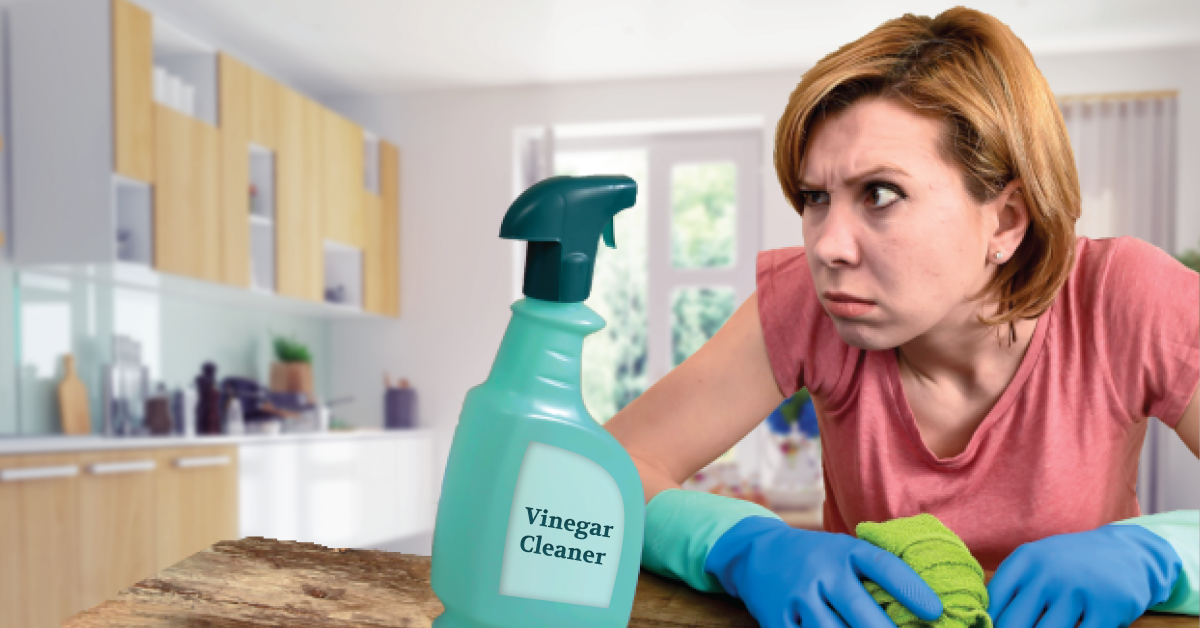

Imagine this: it’s Saturday morning, and you’re ready to tackle the mess in your kitchen and bathroom. Armed with your trusty spray bottle of vinegar, you feel confident. After all, it’s been called a “miracle cleaner” for years. Counters, grout, shower glass—you’ve got this.
But as you wipe down your granite countertops, you notice they look duller than they used to. The grout in your bathroom seems discolored, even though you just scrubbed it. And that streak-free shine you were expecting on your shower glass? Now there’s a cloudy film you can’t seem to buff out.
Chirp… chirp…
Sound familiar? You’re not alone. Many people have experienced this same frustrating silence after relying on vinegar for cleaning. It’s no wonder—vinegar is often touted as a natural, budget-friendly solution for every surface. But here’s the thing: vinegar isn’t as safe or effective as you’ve been led to believe. In fact, it might be doing more harm than good.
This article is here to set the record straight. We’ll uncover the hidden downsides of vinegar and share better, safer ways to keep your home sparkling clean.
Vinegar Cleaning Myths – What You’ve Been Told
Let’s rewind a bit. Why is vinegar such a popular choice for cleaning? It’s cheap, natural, and always seems to be in your pantry. From your grandma’s tips to cleaning hacks all over social media, everyone says it’s a no-brainer. But let’s dig a little deeper.
One of the biggest myths about vinegar is that it’s safe to use on everything. Sure, its acidity helps dissolve grime, but that same acidity can damage surfaces over time. Take granite and marble countertops, for example. Vinegar strips away their protective seal, leaving them dull and vulnerable to stains. And grout? Instead of cleaning it, vinegar can actually weaken it, causing it to crumble or discolor.
It’s like using sandpaper to clean glass. Sure, it might work at first, but you’re left with damage you didn’t bargain for.
Then there’s the belief that vinegar is the ultimate fix for soap scum and hard water stains. While it might seem to cut through some grime, it often leaves behind streaks and a cloudy residue, especially on glass and shiny surfaces. Worse, when vinegar mixes with hard water, the results can be downright disappointing—streaks, smears, and more cleaning to fix the mess.
And let’s not forget safety. Have you ever heard that mixing vinegar with bleach makes a “stronger” cleaner? In reality, it creates dangerous fumes that can irritate your eyes and lungs. Even on its own, vinegar’s strong odor can be overwhelming, especially in closed spaces like showers.
The truth? Vinegar is no miracle worker. It’s a decent cleaner in a pinch, but it’s not the catch-all solution many believe it to be—and it might be causing more headaches than it’s worth.
Vinegar Damage Surfaces: Where Things Go Wrong
Vinegar has built a reputation as a go-to natural cleaner, but what many homeowners don’t realize is how it reacts with common household surfaces. Its high acidity, while effective at cutting through certain types of grime, can also cause lasting damage if used improperly. Let’s break down where things go wrong.
How Vinegar Reacts with Common Surfaces
-
-
Countertops (Granite, Marble, and Other Natural Stones):
Natural stone surfaces like granite and marble are beautiful investments, but they’re no match for vinegar’s acidic nature. Over time, vinegar corrodes the protective sealant on these surfaces, leaving them vulnerable to stains, scratches, and dullness. Think of it like sandpaper slowly eroding the sheen on your countertops—it’s a slow, irreversible process.
Homeowners often notice that their once-glossy surfaces lose their shine after regular vinegar cleaning. Worse, without the sealant, these stones absorb liquids and stains, leading to expensive repairs or replacements.
-
-
-
Grout:
Grout may seem tough, but it’s actually porous and prone to damage. When you clean grout with vinegar, the acid seeps into the tiny crevices, weakening its structure over time. What you’re left with is crumbling, discolored grout that looks worse than when you started.
Instead of the clean, fresh look you’re aiming for, you might find yourself asking, “Why does my grout look even dirtier?” That’s because vinegar can pull dirt deeper into the pores while breaking down the material itself.
-
-
-
Metals (Faucets and Sinks):
Vinegar can tarnish and corrode metals, especially if it’s left on for extended periods. Faucets, stainless steel sinks, and other metallic fixtures often end up with unsightly spots or a dull finish after regular exposure to vinegar. Imagine trying to polish your fixtures, only to discover they’ve lost their luster entirely.
-
The Problem with Acidic Cleaning
-
-
Degrading Protective Coatings:
Many surfaces in your home, from glass shower doors to wood floors, have protective coatings designed to withstand wear and tear. Vinegar’s acidity eats away at these coatings, leaving the underlying material exposed to further damage.
For example, wood floors treated with a protective layer can start warping or losing their finish when cleaned with vinegar. Over time, this can turn into a costly issue that a quick wipe-down simply can’t fix
-
-
-
Residue Build-Up with Hard Water:
When vinegar mixes with hard water, it can leave behind a residue that’s tough to remove. Instead of the sparkling surface you were hoping for, you end up with streaks, spots, or even a sticky film that attracts more dirt. It’s the ultimate cleaning frustration—you do the work, but your surfaces still don’t look clean.
-
Questions to Address
-
-
What specific surfaces should never be cleaned with vinegar?
Avoid using vinegar on natural stone (granite, marble, limestone), grout, waxed wood, and certain metals like aluminum and cast iron. These materials are especially vulnerable to vinegar’s acidic properties.
-
-
-
Can vinegar damage surfaces long-term?
Absolutely. The damage caused by vinegar isn’t always immediately visible, but over time, the corrosion, discoloration, and weakening of materials add up. What starts as a small imperfection can eventually lead to expensive repairs or replacements.
-
Takeaway
While vinegar might seem like a one-size-fits-all cleaning solution, it’s important to know its limits. Using it on the wrong surfaces can do more harm than good, leading to long-term damage and costly fixes. The good news? There are better, safer ways to keep your home clean—without the risk.
Why Vinegar May Be Ineffective for Certain Cleaning Tasks
Vinegar is often hailed as an all-purpose cleaner, but when it comes to tackling heavy-duty grime, its limitations quickly become apparent. Whether you’re battling soap scum, mold, or stubborn grease, vinegar might not be the solution you’ve been hoping for. Let’s look at why vinegar often falls short in these common cleaning scenarios.
Soap Scum and Lime Deposits: A Tough Battle
Soap scum and lime deposits are notorious for clinging to surfaces like shower glass, tiles, and faucets. While vinegar’s acidity can help loosen some of this buildup, it often struggles to dissolve thicker layers.
Imagine scrubbing your shower walls with vinegar, only to find streaks and patches of soap scum stubbornly sticking around. That’s because soap scum—a mix of soap, oils, and minerals from hard water—requires more than vinegar’s mild acid to break it down completely. In many cases, you’ll need to use extra elbow grease or combine vinegar with other products, defeating the purpose of an “easy” cleaner.
Mold and Mildew: Incomplete Removal
Mold and mildew thrive in damp areas like bathrooms and kitchens, and while vinegar can kill some surface mold, it doesn’t always reach the root of the problem. Mold spores often hide deep within porous materials like grout, and vinegar’s effectiveness is limited to what it can reach on the surface.
This incomplete removal often leads to regrowth, leaving you frustrated as the same spots reappear just days or weeks after cleaning. It’s like pulling weeds from your garden but leaving the roots intact—they’re bound to grow back. For stubborn mold, you need a cleaner specifically designed to penetrate deeper and eliminate spores effectively.
Food Residue and Grease: Smearing the Problem
When it comes to greasy kitchen messes, vinegar can often make matters worse. Instead of breaking down grease, vinegar tends to smear it across the surface, creating an even bigger mess. This is especially frustrating when cleaning stovetops, countertops, or sinks after cooking.
Think of it like using water to clean up an oil spill—it spreads the grease around instead of lifting it away. Vinegar’s lack of grease-cutting properties means it simply isn’t the right tool for the job, leaving you wondering why your counters still feel sticky after cleaning.
Key Takeaway
While vinegar has its uses, it’s far from a heavy-duty cleaner. Tasks like removing soap scum, tackling mold, or breaking down grease often require stronger, specialized products to get the job done right. Relying solely on vinegar can lead to incomplete cleaning and even more frustration, especially when dealing with tough grime.
Best Alternatives to Vinegar for Surface Cleaning
If vinegar isn’t the all-purpose miracle cleaner it’s often made out to be, what should you use instead? The good news is that there are plenty of safer, more effective alternatives that can handle tough cleaning jobs without damaging your surfaces. From eco-friendly solutions to professional-grade products, here are the best options for keeping your home spotless.
Eco-Friendly and Safe Solutions
- pH-Neutral Cleaners:
Unlike vinegar, pH-neutral cleaners are gentle on surfaces but tough on dirt. They don’t corrode sealants, discolor grout, or tarnish metals. These are especially ideal for natural stone countertops and delicate materials.
For example, a pH-neutral cleaner can safely lift grime off marble without dulling its finish—a task vinegar would struggle with.
- Enzymatic Cleaners:
These cleaners use natural enzymes to break down organic matter like mold, mildew, and food residue. They’re highly effective for deep cleaning while being safe for your home and the environment.
Picture spraying an enzymatic cleaner on stubborn mold and watching it dissolve the problem at its source, preventing regrowth.
Professional-Grade Alternatives
- MARBLELIFE Tile and Grout Cleaners:
These specialized cleaners are formulated to safely clean and restore grout and tile surfaces without the risks associated with vinegar. Whether you’re dealing with soap scum, lime deposits, or stubborn grime, MARBLELIFE’s solutions get the job done effectively while protecting your surfaces.
- MARBLELIFE Countertop Cleaning and Repair Products:
For granite, marble, and other natural stone surfaces, MARBLELIFE offers cleaners that not only remove dirt but also restore shine and maintain the protective seal. Think of it as giving your countertops the spa treatment they deserve.
- MARBLELIFE Shower Cleaning Products:
Streak-free solutions for glass, tiles, and fixtures in your shower. These products are designed to tackle soap scum and hard water stains without leaving residue, unlike vinegar.
Tailored Solutions for Tough Cleaning Jobs
- Soap Scum and Lime Deposits:
Use a dedicated shower cleaner or tile and grout product that cuts through buildup without damaging surfaces.
- Mold and Mildew:
Opt for enzymatic or professional mold removers to reach deep into porous materials like grout and prevent regrowth.
- Food Residue and Grease:
A degreaser or castile soap works far better than vinegar for breaking down kitchen messes.
Key Takeaway
While vinegar might seem like the easy choice, specialized products like those from MARBLELIFE and safe DIY alternatives offer better results with less risk. These solutions are designed to handle specific cleaning challenges without damaging your home, giving you the spotless, stress-free clean you’re looking for.
Tips for Avoiding Surface Damage While Cleaning
Cleaning your home doesn’t have to be a game of trial and error. By following a few key tips, you can keep your surfaces spotless and damage-free—no vinegar required. Let’s dive into some practical ways to protect your home while tackling grime effectively.
1. Know Your Surface
Not all surfaces are created equal. Whether it’s granite countertops, tiled showers, or stainless steel fixtures, each material requires a specific type of cleaner. Using the wrong product—like vinegar—can strip away protective coatings, dull finishes, or even weaken the material over time.
For example, natural stone like marble and granite should only be cleaned with pH-neutral products designed to maintain their sealant and shine. Grout and tiles, on the other hand, benefit from specialized cleaners that remove dirt without causing discoloration or weakening.
Pro Tip: Always check your manufacturer’s cleaning recommendations or consult professionals like MARBLELIFE to ensure your surfaces stay in top shape.
2. Avoid Mixing Cleaners
It might seem like combining products would give you a more powerful clean, but mixing cleaners can be dangerous—or counterproductive. For instance, combining vinegar with bleach creates toxic fumes that are harmful to your health. Even less extreme mixtures, like vinegar and baking soda, can leave behind residue that makes surfaces look dull or streaky.
Stick to one product at a time, and choose cleaners specifically formulated for the task at hand.
3. Test Before You Clean
Before applying a new cleaner to an entire surface, always do a spot test in an inconspicuous area. This simple step can save you from unpleasant surprises, like discoloration, streaks, or damage.
For instance, if you’re trying a new grout cleaner, test it on a small section first to ensure it doesn’t alter the color or texture of the grout.
4. Routine Maintenance Over Heavy Cleaning
Preventing buildup is much easier—and safer—than removing it. Establish a regular cleaning routine to tackle grime before it becomes a problem. This reduces the need for harsh scrubbing or strong cleaners, keeping your surfaces in better condition over the long term.
For example:
- Wipe down countertops daily with a gentle, pH-neutral cleaner.
- Squeegee your shower glass after each use to prevent soap scum.
- Use a weekly grout-safe cleaner to keep your tiles looking fresh.
Key Takeaway
Cleaning your home doesn’t have to come at the expense of your surfaces. By knowing your materials, avoiding harmful mixtures, and staying consistent with maintenance, you can protect your home from unnecessary damage. For the best results, choose specialized products like MARBLELIFE’s professional-grade cleaners to keep your surfaces spotless and safe.
Conclusion: Choose Wisely for a Cleaner, Damage-Free Home
Vinegar might seem like a simple, natural solution for cleaning, but as we’ve uncovered, its risks far outweigh its rewards. From corroding countertops and tarnishing metal fixtures to weakening grout and leaving streaks behind, vinegar often causes more problems than it solves. Add to that its limitations with heavy-duty cleaning tasks like soap scum, mold, and grease, and it’s clear that vinegar isn’t the miracle cleaner it’s claimed to be.
Switching to safer, specialized alternatives can save you time, effort, and the cost of repairing damaged surfaces. Products from MARBLELIFEProducts.com are designed to protect and restore your home, offering professional-grade solutions for tile and grout cleaning, countertop care, and even shower maintenance. And if your surfaces are already showing signs of damage, MARBLELIFE’s professional cleaning and repair services can help bring them back to life.
Take the first step today: book a FREE CONSULTATION to understand how our stone care expert can transform your cleaning routine and keep your home looking its best. Because a clean home shouldn’t come at the cost of your surfaces.


